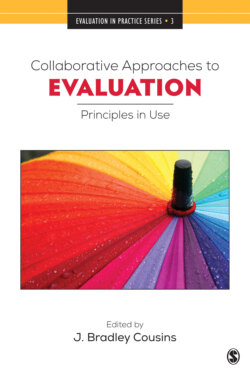Читать книгу Collaborative Approaches to Evaluation - Группа авторов - Страница 11
На сайте Литреса книга снята с продажи.
1 Situating Evidence-Based Principles to Guide Practice in Collaborative Approaches to Evaluation (CAE)
ОглавлениеJ. Bradley Cousins, University of Ottawa
Lyn Shulha, Queen’s University
Elizabeth Whitmore, Carleton University
Hind Al Hudib, Independent Researcher, Ottawa1
Nathalie Gilbert, Champlain Local Health Integration Network, Ottawa
1 Much of the work on this chapter was completed while H. Al Hudib and N. Gilbert were doctoral candidates at the University of Ottawa.
Years ago, somewhere around 2011–12, some members of our research team began to converse about our common interests in evaluation. Specifically, on different occasions and usually in dyads, Brad Cousins, Bessa Whitmore, and Lyn Shulha discussed recent developments in our field and how these aligned or misaligned with our own perspectives. Some of our discussions had to do with the consequences of evaluation, particularly issues associated with enhancing process use, use of evaluation findings, and leveraging social change. Sometimes we talked about research on evaluation (RoE), particularly about how to support and grow such activity. But mostly, our conversations touched on evaluation practice near and dear to our hearts: participatory and collaborative approaches. The conversation developed over time in spits and starts and eventually was enhanced through our sponsorship of two American Evaluation Association (AEA) think tank sessions (2011, 2012). Ultimately, we decided to coauthor a paper that we hoped would pique some interest and dialogue about direction for the field. In that article (Cousins, Whitmore, & Shulha, 2013) published a year later, we laid out some arguments supporting the case for the development and validation of a set of principles to guide practice in participatory and collaborative approaches.
The thing about laying out arguments favoring specific courses of action over others is that doing so comes with a certain amount of risk. That is to say, it may be all well and good to critique the field and offer ideas about potential remedies to identified problems, but it is quite another undertaking to walk the talk. How can you responsibly make arguments to develop a set of principles and then leave it at that? Perhaps we had been mulling over the idea, but it would be safe to say that at the point of completion of this initial piece, we decided to roll up our sleeves and take on what turned out to be a rather enormous challenge, one that developed into a full-blown research program.2 Shortly thereafter we formed the research team and named it Collaborative Opportunities to Value Evaluation (COVE) with two doctoral candidates (Nathalie Gilbert and Hind Al Hudib) joining with the coprincipal investigators on a multiyear journey. This book is a continuation of that now long-running research program; and evidence-based principles to guide participatory and collaborative evaluation practice have been at the center of it all.
2 We are indebted to the University of Ottawa for financial support for the research.
In this chapter, we define what we mean by collaborative approaches to evaluation (CAE) and then talk about the rather significant growth in the field over the past few decades. We then summarize our primary justifications for developing the principles and then describe in some detail our systematic empirical approach to the challenge of developing and validating them. This leads to an overview of the resulting set of eight principles and some of the support materials that accompany them, followed by our own thinking about how the principles are likely to best serve the field. We consider this set of principles to be preliminary and subject to refinement, adjustment, and continued development over time, and as such, we end the chapter with a recap of our global launch of the principles and simultaneous call for field studies. Test driving the principles in authentic evaluation practice situations around the globe is what this book is all about.
